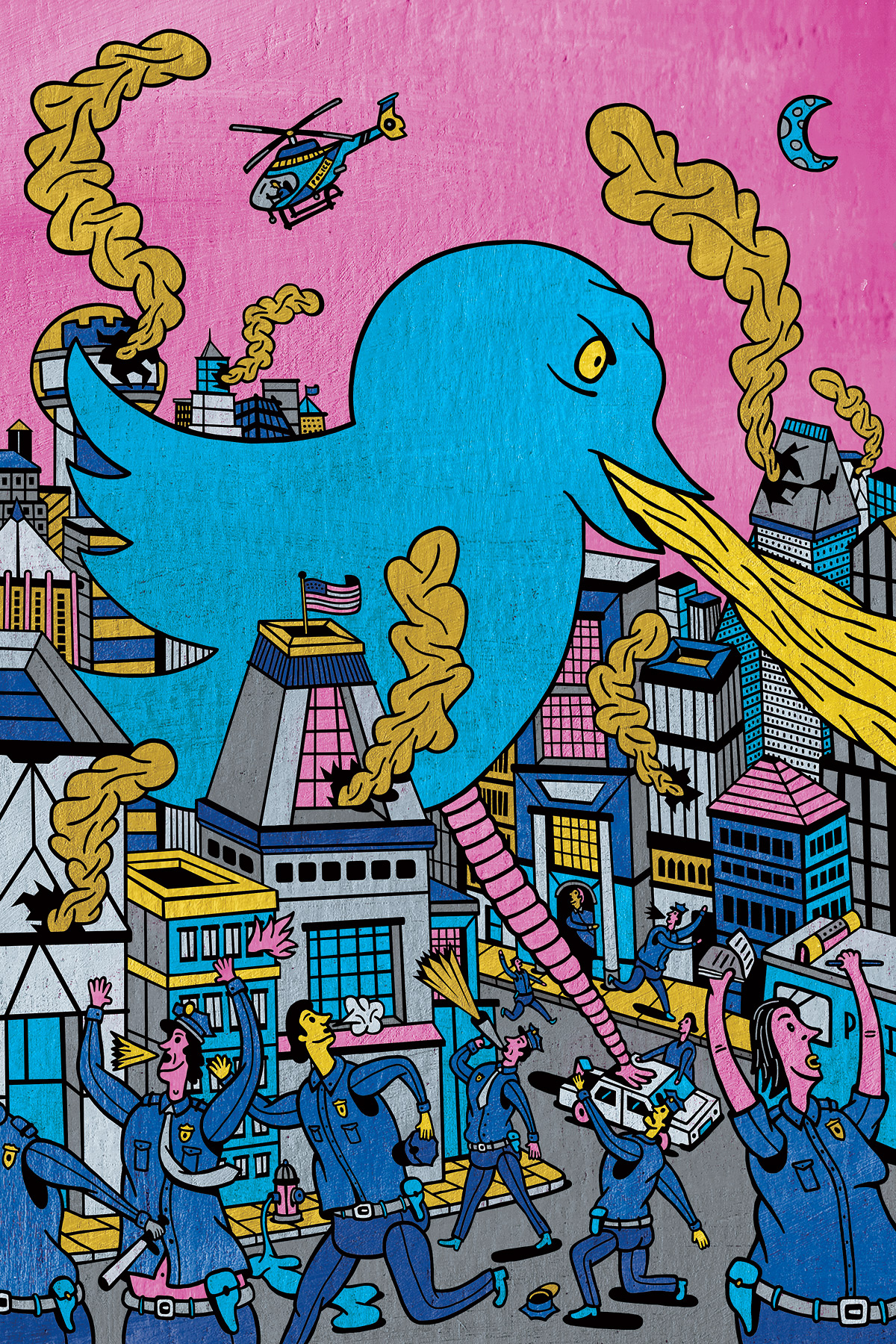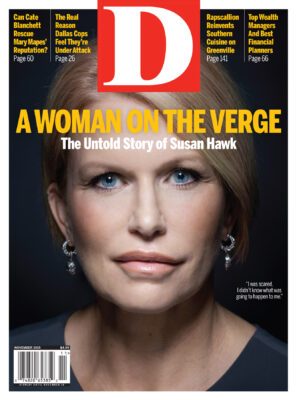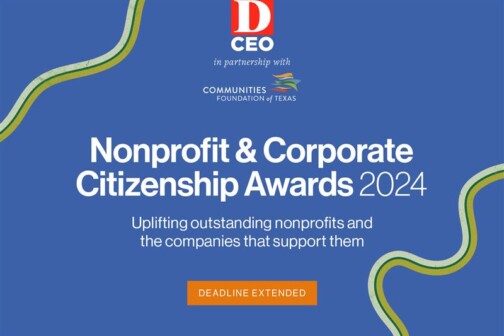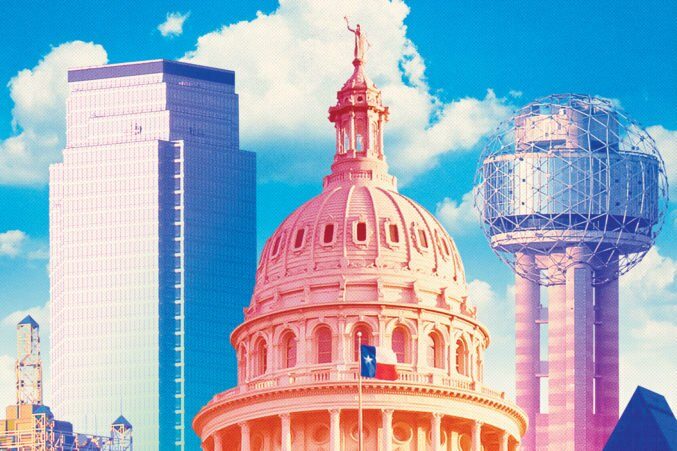Is violence against police officers increasing? Is it more dangerous now than ever to be a cop? Is there, as Lieutenant Governor Dan Patrick claims, a “war on cops”?
Some in the local media think so. FOX Channel 4 recently turned a Facebook post from a police chief in tiny Rhome, Texas, into a story about the “war on police.” In a one-hour special examining the fear cops have in putting on their uniforms, CBS Channel 11 opened by saying, “In recent months, anti-police sentiment has reached a level, honestly, that most of us have never seen.” As proof, the reporter mentioned three killings of police officers across the nation, including one in Houston.
Dallas cops, too, think their job has become more dangerous. The Dallas Police Association recently, and sensibly, requested that the department not immediately release names of officers involved in deadly shootings for fear of their families being harassed or targeted. But the DPA’s press release about its request stated: “With the recent surge in murders of law enforcement officers, the men and women who proudly wear the badge—and their families—are in more danger than ever.”
That’s simply not true. Statistics show that the past few years have been the safest on record for police officers across the country. As of September, we were on pace for 35 cop killings in the country. We’ve averaged about 50 or so for the past decade, down from the mid-1970s, when more than 100 cops were killed in the line of duty annually. But our population is growing, which means the rate of killing is also going down. The Washington Post’s Radley Balko, a leading expert on the subject, recently wrote that 2015 looks like it will be the second-safest year for police ever, after 2013. Cops say there are fewer deaths because medical technology, training, and protective gear have gotten better. Balko has destroyed that argument, too, showing that assaults on police officers are down.
Why, then, are cops not comforted by the data? Why do they say they feel less safe wearing the uniform?
I’ve got a friend, a Fort Worth cop, who thinks he knows the answer. He’s a 20-year veteran and works the toughest cases (gangs, drugs, that sort of thing). He has worked in both Fort Worth and in Dallas. Without telling him what I was working on, I texted him a question: “Is it more dangerous to be a cop now than when you started?”
His response: “I feel it is all due to social media. Police have always been getting killed, ambushed, etc. It’s only now that every incident is on the news. I personally do not see a difference between now and 20 years ago.”
Cops don’t have time to patrol their beats and talk to citizens. So the people get the impression that cops don’t care about them—which makes cops feel that they’re not supported.
But there is no “surge in violence” against cops. Perpetuating that myth does real harm. It takes an already tense relationship between citizens and cops and makes it even more fraught.
In Dallas, that’s the real problem: the way citizens see cops. Or, rather, how long it takes them to see cops. Response times. That’s what we should be talking about.
There are 3,600 officers in the Dallas Police Department. That’s enough to do the job. But for many complicated reasons—officers being put on special assignments, the department losing its best young cops because it doesn’t pay rookies enough, older cops burning through vacation time as they anticipate retirement—there are way too few officers on the streets actually handling your calls. And cops know this. It’s why they have low morale and why citizens are growing frustrated.
“This all comes down to a lack of trust between us and the communities,” says DPA president Ron Pinkston. “And that lack of trust exists because we’ve gotten away from the basics.”
Pinkston and other cops say that, in Dallas, that lack of trust doesn’t come from an us-vs.-them dynamic such as was on display last year in Ferguson, Missouri. They say Dallas cops aren’t doing their jobs properly because they simply can’t. Sergeant Michael Mata, a DPA vice president, describes—and sends along log sheets to confirm—understaffed police divisions stretched so thin that some evenings it takes six hours to respond to serious calls.
“It sucks knocking on a door at 1:30 am to take a theft report from someone who called 911 at 3:15 pm,” Louis Mills, a Dallas cop and former Marine, wrote in an open letter to his fellow officers. “Even worse, a family violence call two and a half hours old. I’m not showing up late because my morale is low. As soon as I get the call, I code 6 [arrive at the scene] as fast as general orders allow me to. Part of the reason my morale is low is because I’m showing up so late … It is downright embarrassing. Truth be told, it is depressing. We are the face of the department, so when we show up so late, we take the brunt of the citizen’s anger and frustration. I don’t blame them one bit.”
Six- to 10-hour response times. That’s the real problem facing Dallas cops right now. This is what is causing distrust between officers and those whom they serve. This is the issue that is backed up by data. In August, the Dallas Morning News showed that police response times to all calls, even the most urgent, were up significantly across the department—“the slowest they’ve been since at least 2007,” according to the paper’s analysis.
But even that analysis doesn’t fully explain how systemic the problem is. Mata tells of a recent evening at the Southwest Patrol Division when he had just six officers to respond to overnight calls (understand that protocol requires that two officers respond to certain dangerous situations). This for a substation that supposedly houses 300 officers to serve 200,000 residents over a 75-square-mile area.
“We don’t have cops who view themselves as warriors,” Mata says. “That might be a problem in other cities. Not here, except for maybe one or two bad apples. We have cops who see themselves as protectors who simply don’t have time to know the people they serve, because they have no support from the administration. If you’re always running hours behind on calls, you can’t stop and shake someone’s hand and get to know him.”
Cops don’t have time to patrol their beats and talk to citizens. So the people get the impression that cops don’t care about them—which makes cops feel that they’re not supported. The distrust and frustration have fueled a slow boil in parts of Dallas, with even more heat added by what cops and citizens alike see in their Facebook and Twitter feeds.
Council members I’ve talked to understand this is a problem, and they don’t buy Chief David Brown’s contention that slower response times and a decrease in police shootings can be attributed to better training and more thoughtful policing. (There will always be fewer shootings when it takes six hours to respond to a crime, because the bad guys are long gone when cops arrive.) But they say police organizations need to stop complaining about every grievance—pension, pay, public safety budget, deadly force policies—and focus on response times, because it gets at the core of the problem. Citizens will back them.
In fact, once media and Council members began asking tough questions about response times, Brown in late September added more than 100 cops to patrol beats. It’s not enough, but it’s a start. It should improve cop-citizen interactions and decrease the vitriol on social media. Cops will take more pride in their work, and citizens will feel safer. It’s a lesson in battling real problems, not fairy tales.






